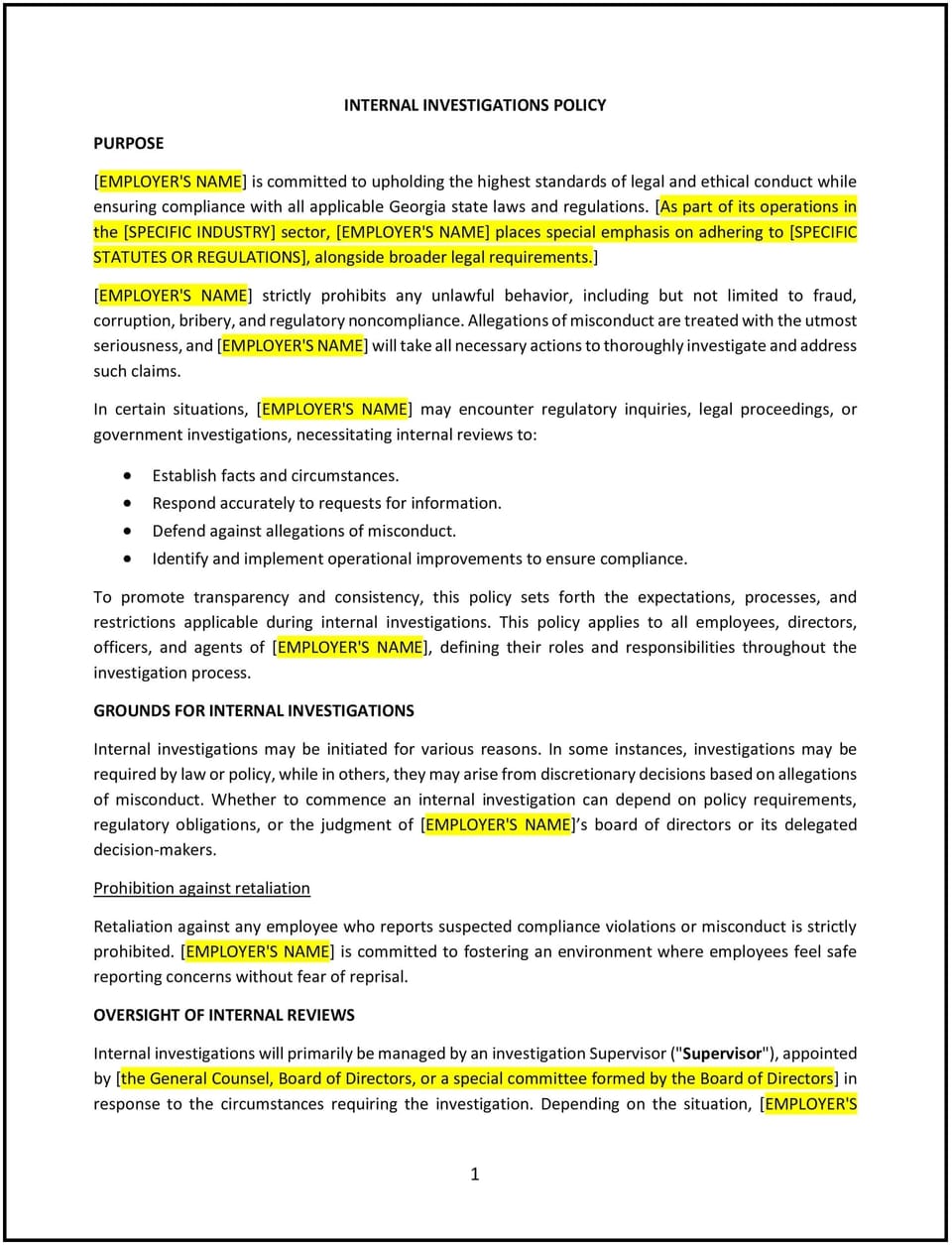Internal investigations policy (Georgia): Free template

Internal investigations policy (Georgia)
This internal investigations policy is designed to help Georgia businesses manage workplace investigations related to misconduct, policy violations, or other concerns. The policy outlines procedures for initiating, conducting, and concluding investigations while maintaining fairness, confidentiality, and consistency.
By implementing this policy, businesses can address workplace issues effectively, protect employee rights, and maintain organizational integrity.
How to use this internal investigations policy (Georgia)
- Define the scope: Clearly identify the types of issues that warrant an internal investigation, such as harassment, discrimination, theft, or policy violations.
- Establish roles: Assign responsibility for conducting investigations to HR, management, or designated investigators to ensure impartiality and expertise.
- Outline the process: Provide a step-by-step procedure for handling investigations, including how to gather evidence, interview witnesses, and document findings.
- Emphasize confidentiality: Require all parties involved to maintain confidentiality to protect the integrity of the investigation and prevent retaliation.
- Set timelines: Specify timeframes for initiating, conducting, and resolving investigations to ensure timely resolution.
- Communicate with involved parties: Inform the complainant, respondent, and witnesses about the process and their rights during the investigation.
- Provide corrective actions: Detail potential outcomes of investigations, such as disciplinary measures, policy revisions, or employee training.
- Review and update regularly: Periodically assess the policy to ensure it reflects changes in Georgia laws, workplace dynamics, or best practices.
Benefits of using this internal investigations policy (Georgia)
Implementing this policy provides several advantages for Georgia businesses:
- Promotes fairness: A structured process ensures investigations are conducted impartially and consistently.
- Protects employee rights: Clear procedures safeguard the rights of all parties involved in an investigation.
- Resolves issues effectively: Prompt and thorough investigations address workplace concerns and minimize disruptions.
- Enhances trust: Employees are more likely to report issues when they trust the organization to handle investigations professionally.
- Reflects Georgia-specific considerations: Tailoring the policy to local legal and cultural norms ensures its relevance and practicality.
Tips for using this internal investigations policy (Georgia)
- Train investigators: Provide training to ensure investigators understand how to handle sensitive situations and gather evidence appropriately.
- Monitor progress: Regularly review the status of investigations to ensure they remain on track and meet established timelines.
- Maintain objectivity: Avoid conflicts of interest by ensuring investigators are not personally involved in the issues being investigated.
- Document thoroughly: Keep detailed records of all steps taken during the investigation, including interviews, evidence, and conclusions.
- Act on findings: Implement corrective actions promptly to address issues identified during investigations and prevent recurrence.
Q: What types of issues should trigger an internal investigation?
A: Investigations should be initiated for allegations of misconduct, harassment, discrimination, theft, fraud, or violations of company policies.
Q: Who should conduct internal investigations?
A: Internal investigations should be conducted by HR, management, or trained investigators to ensure impartiality and professionalism.
Q: How can businesses ensure confidentiality during investigations?
A: Businesses should limit access to information, require all parties to maintain confidentiality, and use secure methods to store investigation records.
Q: What steps should businesses take if an investigation reveals a policy violation?
A: Businesses should implement appropriate corrective actions, such as disciplinary measures, additional training, or policy updates, based on the findings.
Q: How should businesses communicate with employees during investigations?
A: Businesses should inform involved parties of the process, timelines, and their rights while avoiding unnecessary disclosure of details.
Q: What should businesses include in investigation records?
A: Records should include complaint details, evidence, interview notes, findings, and actions taken as a result of the investigation.
Q: How often should this policy be reviewed?
A: The policy should be reviewed annually or whenever changes occur in Georgia’s legal landscape or workplace practices.
This article contains general legal information and does not contain legal advice. Cobrief is not a law firm or a substitute for an attorney or law firm. The law is complex and changes often. For legal advice, please ask a lawyer.


